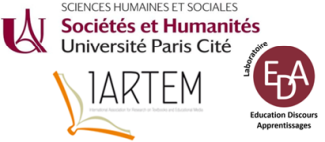This paper presents partial results of the doctoral research that had as one of its objectives to identify and discuss which elements of coercion were present in the narratives of Brazilian authors of scientific articles, dissertations, and theses published in the last 20 years whose main object of study was the authors of textbooks.
The narratives of coercion were compared and theoretically-methodologically based on the ideas presented in the work “The Microphysics of Power” by Michel Foucault (1998), mainly discussing the concepts of knowledge, power, and subject and the reflections presented in “The Intellectuals and Power” by the same philosopher. According to the research data, several points of tension were found between the authorial and official voices, such as: (1) the distance between the guidelines of the Public Notice of the National Textbook and Teaching Material Program (PNLD) and the proposals presented by publishers, comparing them to what actually occurs in textbooks; (2) the theses of silencing discourses in order to consider their implications for the production of what should or should not be inscribed in the constituent files of textbooks; (3) stereotypical images dealing with certain discourses about political-social themes; and (4) the war for the senses, which, according to Orlandi (2021), requires ways of relating to coercion, of practicing the plasticity of language, considering that it is in the materiality of the discourse that the possibility of reaching the real concrete of meaning resides. Therefore, these conflicts show that there is a system of power that stops, prohibits, and, often, invalidates the speech of textbook authors and their knowledge as intellectuals, and their role is not to act neutrally, but rather to place themselves as erudite and political professionals fighting against oppressive forms of power, giving meaning to what they write and act, as this subject is the object and instrument of his work in relation to knowledge, “truth”, “conscience”, and “speech”. These approaches presented in the works analyzed lead to a brief epistemological analysis of the relations of knowledge and power, together with the production of knowledge. Foucault (1998) presents in such work that power is not expressed solely through repression, but also through the formation of theoretical and ideological assumptions that predominate in the most varied areas of society, such as what happens with the production of textbooks, and that the dominant class, represented here by official voices, will be able to convince and remain in power, which must be analyzed as something dynamic, that is, as something that circulates and only works in a chain, never acting alone, since there is always a transmission center – as power mechanisms exert very subtle controls, which were diagnosed by the authors of the 7 works mentioned.
We conclude that this coercive movement of discourses creates insecurity among the authors, and the meanings that should be produced in didactic books and materials end up, systematically, being emptied, becoming disposable while, according to Orlandi (2007), these situations need to be negotiated – as coercive forces can also influence the composition of the files constituting these materials and can often limit the creative process of their authors.
References
FOUCAULT, Michel. (1998). Microphysics of power. Graal Editions.
ORLANDI, Eni Puccinelli. (2007). The forms of silence: In the movement of the senses. Unicamp Editor.
ORLANDI, Eni Puccinelli. (2021). interpretation Volatility: politics, imagination and fantasy. Abralin.Org 2 (1). 1-15. https://doi.org/10.25189/2675-4916.

 PDF version
PDF version
